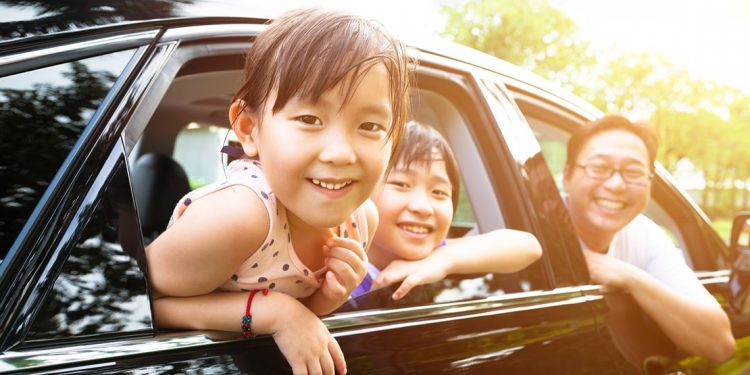
Help Your Child Get the Most out of Your Trips, Even If They Won’t Remember All of It
Traveling with kids isn’t without its share of difficulties, but it can be incredibly rewarding if you want to give your child a better appreciation for the diversity in the world and to give them experience navigating new situations.
According to social psychologist Susan Newman, though the age varies from child to child, children start to be able to remember their vacations at around five or six years old. In fact, a poll taken by the US Travel Association found that the most vivid childhood memories adults have tend to be of family vacations that took place when they were as young as 5 years old.
Though we can recall very few details from our own childhood, there’s something about family vacations that finds a strong purchase in our minds at a young age.
Sure, your kids aren’t going to be able to remember every detail of the trips you take them on, but regardless of this they are still reaping the benefits of travel.
The overall impact those trips will have on them will become apparent in those vivid memories your children will develop and hold onto, becoming a paradigm of the impact a particular travel experience had on their life.
So what exactly does travel have the potential to instill in our children and how do we ensure this happens?
Foster Creativity
No matter what their age, the benefits of travel aren’t just reflected in the sights they see along the way. Long after that trip is over, it continues to boost creativity in children, particularly those who have experiences with a new culture.
Erin Clabough, a neurobiologist and mother of four young kids, explains, “Fostering creativity in the minds of your children, although not as easy to visualize, can be an equally important reason to finally take that trip you’ve been planning.”
To further encourage creativity and help your kids remember more of the details, find creative ways to document your travels. There are many options that you can work on collaboratively with your kids, or that will allow your kids to document independently.
A simple idea involves bringing a notebook or journal and asking them to record what happens each day. You could also get them their own camera so they can capture what they see from their perspective.
There are plenty of fun travel hacks on Pinterest that will help keep your kids entertained on the road or in the air, too! When lacking ideas for engaging your kids, head to the internet to see what fun activities other parents have come up with.
Sometimes the destination does the work for you, providing children with opportunities for creativity. A fun Disney cruise tip is to look out for details all over the ship; there are small Mickeys to be found on board and every piece of artwork has a secret, encouraging even young children to think outside the box when exploring their surroundings.
Bond as a Family
Traveling together is one of the best possible ways for parents and their kids to bond with one another. One of the ways to enhance this is to work together as a team by giving everyone a different responsibility they wouldn’t normally have at home.
While traveling, study maps together and show them exactly where you’ll be going next and how far it is. Plan itineraries together, and get the kids involved in solving issues that inevitably occur.
Even small children can make simple decisions that can affect the entire family. That helps boost their sense of self-worth in addition to giving them practice at making decisions and living with the consequences.
On the other end of the spectrum, this same tip can be helpful when traveling with teens. They might feel more excited about the trip if they get to be part of the planning process and know that there are some items on the itinerary they specifically will enjoy doing.
As long as you control the options they have to choose from, you can be assured their choice will be a good one.
One of the most important things to remember is to be flexible. Don’t get too upset when plans go awry.
Kids soak up everything from their parents, so this is the time to teach them that those bumps are an adventure. Having patience and a sense of humor will help them learn to be calm when challenging situations arise later in life.
If you are traveling abroad and will be spending the holidays away from family here are some tips for overcoming feelings of homesickness.
Celebrate Differences
Learning the value of how to get along with diverse types of people is one of the best life lessons kids can internalize to help them enjoy a better future. Whether you travel to another state or a foreign country, you’ll inevitably meet people from other places.
Some will probably look quite different, have a different style of dress or speak a whole new language.
All of those experience offer the perfect opportunity to show children firsthand the diversity in the world, and teach them not to fear differences but to celebrate them as something that adds depth to their lives.
This will give your children a broader perspective, as they’ll realize that the rest of the world isn’t how it is back home in a suburb. They’ll understand that people live differently, and have different values.
Travel Through Your Children’s Eyes
While traveling, try to look at each experience through your children’s eyes. Consider them to be your magnifying glass.
Slow down, be patient and allow them to ask, “Why?” There are many moments during travel that are educational opportunities, but as adults we often whisk through them, hurrying from one attraction to the next.
By slowing down, parents benefit too, seeing the world in a whole new way. Stop and examine the fine lines on ancient works of art, letting the kids marvel at the effort it took to create.
Then in the evening when you’ve returned to your hotel, ask them to try and draw some of their favorites. Even if their too young to do much more than scribbles, it will help them remember the experience.
While on a walk through the forest, or along the beach, ask them to identify smells, like the aroma of pine, or the salty sea air.
All of these tactics will help your children develop more vivid memories of their travels and hold onto the lessons they learned along the way for years to come.
